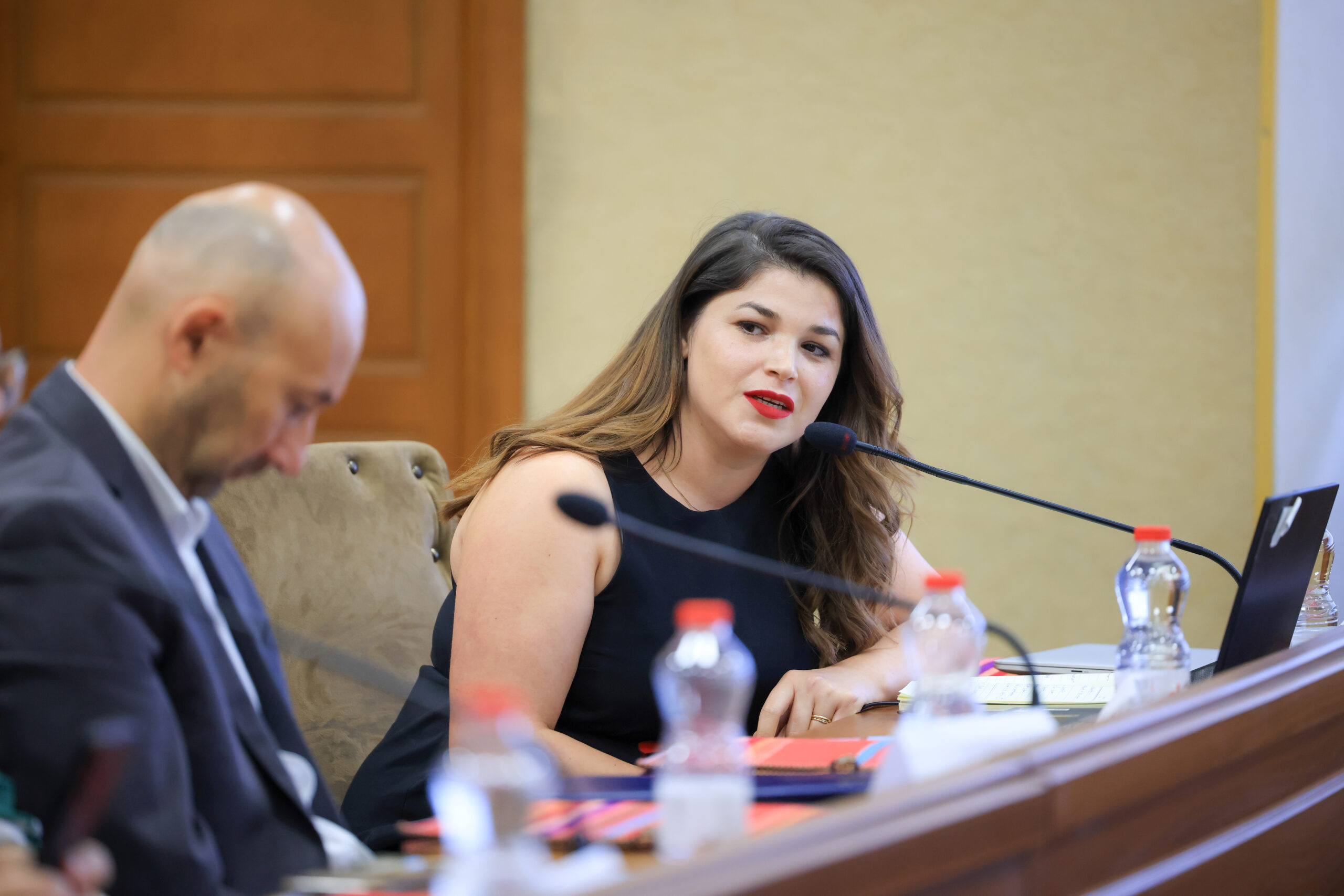The closing event of the EU-funded project “Tightening up the Victims’ Empowering Systems in Albania @ Shkodër (TVESA@Sh)” brought together institutional representatives, civil society organizations, and private sector actors to review project results and discuss future strategies for sustaining inclusive victim support services.
Held at the Municipal Council Hall in Shkodër, the event was organized by the Municipality of Shkodër, Different & Equal (D&E), and KMOP – Social Action and Innovation Centre, under the EU Programme “Support for Social Inclusion in Albania.” The event gathered over 80 participants from diverse professional backgrounds, including representatives from public institutions, civil society, and the private sector.
Opening and Moderation
The event was moderated by Arlinda Kruja, Directorate of Social Services at Shkoder Municipality who skillfully guided the sessions and facilitated dialogue between participants and speakers. She also delivered the closing reflections, summarizing the discussions and highlighting the key takeaways for local policy and practice.
Opening statements were delivered by:
- Miha Pezelj, EU Delegation to Albania, who emphasized the EU’s continued support for inclusive, rights-based models.
- Teuta Shala Qyteza, Deputy Mayor of Shkodër, who expressed the municipality’s readiness to carry forward the project’s integrated services.
- Mariana Meshi (D&E), who reflected on the power of inter-institutional collaboration in improving victims’ lives.
- Esmeralda Xhelilaj (KMOP), who highlighted the importance of building institutional capacity, strengthening local partnerships, and advancing alignment with EU standards.
“As Albania moves rapidly toward the approximation of national legislation and social policies with those of the European Union,” said Xhelilaj, “KMOP has contributed to this process by introducing sustainable models and good practices drawn from the EU context. Through these, we have helped inform national indicators and feed concrete elements into the broader social inclusion agenda.”
Project Results and Impact
Burbuqe Meçaj, Project Manager, presented core achievements, including:
- Establishment of the Social Cause Club in Dajç
- Creation of three women-led social businesses
- Childcare support through Grandma’s House
- Capacity development for local authorities and civil society professionals
- Development of a CSR Guide in Albanian
Engagement of local businesses through public consultations and cluster-building in Shkodër and Dajç Panel Discussion: Sustainability, Good Practices, and Next Steps
Moderated by Esmeralda Xhelilaj, the panel featured:
- Rozafa Zmijani – Director, AKPA Shkodër
- Rudina Kruja – Regional Directorate of Vocational Training
- Silvi Dega – HR Manager, FAMIKO Group
- Flaudora Lukaj – Local Officer, TVESA Project
The discussion focused on the importance of coordinated local systems to protect and empower victims, reflecting the roles of public institutions, CSOs, and the private sector.
- Silvi Dega shared FAMIKO’s CSR initiative—an in-factory childcare service with trained educators and a structured curriculum—which reduced staff turnover and enhanced employee satisfaction. She emphasized that investing in women’s well-being produces long-term business value. The CSR Guide developed under the project was also presented.
- Rozafa Zmijani emphasized the importance of integrated labor market measures, while Esmeralda Xhelilaj noted that employment alone is insufficient—many women, especially survivors of trauma, need holistic support to sustain stable jobs. She stressed that the project’s services—like the Social Cause Club and economic tools—have now been integrated into the Municipality of Shkodër’s Social Plan, ensuring continuity of core services. She also called for compassionate, inclusive approaches that invite beneficiaries themselves to propose ideas for their own support.
- Flaudora Lukaj explained how the Social Cause Club now operates with active involvement from the community, while Rudina Kruja introduced a new life-skills training program that includes soft skills but also highlighted transport barriers for rural women accessing vocational courses.
Women’s Voices: Stories of Self-Employment
Deshira Kolaj, project team member, presented compelling success stories of women beneficiaries who launched their own small businesses through the TVESA@Sh project. These real-life narratives demonstrated how targeted empowerment—combining economic tools, mentoring, and psychosocial support—can lead to renewed self-confidence and autonomy for survivors of violence and trafficking.
Closing Reflections
Arlinda Kruja, event moderator, closed the event by reflecting on the strong collaboration shown throughout the project. She emphasized the importance of sustaining the established support systems and continuing to build bridges between institutional, civil society, and business actors in Shkodër and beyond.
Contact Information:
- Social Cause Club: https://www.klubisocialdajc.eu/
- Municipality of Shkodër: www.bashkiashkoder.gov.al
- Different & Equal (D&E): https://differentandequal.org
- KMOP – Social Action and Innovation Centre (Greece): https://www.kmop.gr/
For more information or to get involved, please visit our websites or contact us directly at al-tvesa-project@kmop.org

